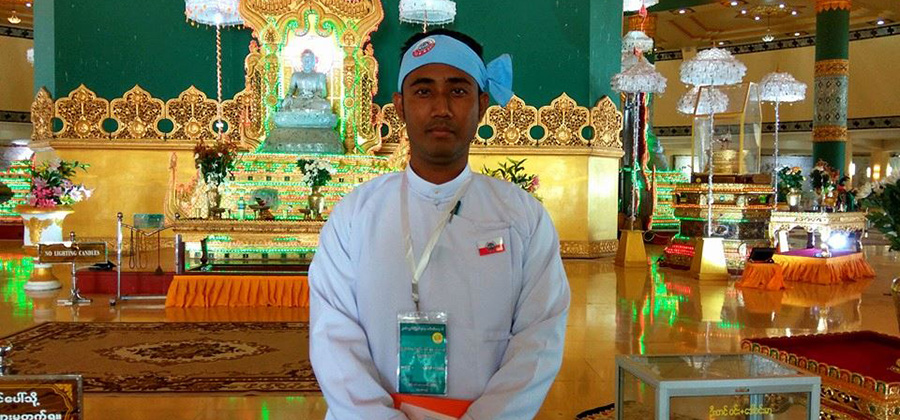YANGON — Police in the Rakhine State capital of Sittwe have arrested an executive committee member of the Arakan National Council (ANC) and six other locals over a bomb attack that injured a police officer over the weekend, according to an ANC official.
ANC general secretary U Tun Zaw said council college Ko Naing Soe, also known as Mae Lone, was arrested in Sittwe on Sunday.
Tun Zaw said the police have filed charges against Naing Soe under multiple articles of the Counter-Terrorism Law that carry a minimum prison sentence of 10 years. He said his first court hearing was scheduled for March 12.
Local police could not be reached for confirmation.
In a video of four men in handcuffs at the Sittwe courthouse on Monday, posted online by Naing Soe’s brother, some of the men say they were “unfairly charged with many articles” and that their rights were being violated.
“Arresting people with doubt [without evidence] will never bring us justice,” says Naing Soe.
Naing Soe was previously arrested by the military in Sittwe in 2009 for the possession of explosive devices and sentenced to eight years in prison. He was granted an amnesty by former President Thein Sein and freed in 2013, according to Tun Zaw.

He said Naing Soe is also a liaison officer for the Arakan Army, an ethnic armed group allied with the ANC, but not a combatant. With only 100 or so active fighters, the Arakan Army has been likened to more of a non-governmental organization by veteran journalist Bertil Lintner, who specializes in Myanmar’s ethnic armed conflicts.
Three remotely detonated bombs rocked Sittwe on Saturday. One of the bombs went off in the backyard of a state counselor’s office. The others exploded near a courthouse and a land records office.
Tun Zaw said authorities have detained about 20 locals in all since the attack. It is unknown how many of them remain in custody.
“In general we accept police detention for questioning when carried out in line with the law, but this arrest was unfair and nonsense,” he said.
The motive for the attack, and who carried it out, remains unknown.
It follows the fatal shooting of seven ethnic Arakan protesters by police in the Rakhine State town of Mrauk-U in mid-January and the subsequent stabbing death of a government administrator who was transferred out of the town a few days after the protest.
It also follows the recent breakdown of efforts to see the ANC sign the Nationwide Ceasefire Agreement (NCA) along with two more ethnic armed groups on Feb. 13.
“We negotiated with the ANC to sign the NCA until the last minute. But when the time comes to sign the NCA, the ANC didn’t come along,” said U Zaw Htay, spokesman for the President’s Office.
A day before the signing ceremony, the ANC said discussions between the government’s Peace Commission and the ethnic armed groups’ Delegation for Peace Negotiations on Feb. 11 ended in deadlock. It said the commission refused to continue debate on eight contentious points and pressured the ANC to finish the negotiations after it signed the NCA.
Tun Zaw said Naing Soe had attended the 21st Century Panglong Peace Conference in 2016 as an ANC representative and was selected to join the group’s delegation to the Feb. 13 signing ceremony before negotiations with the government broke down.
He said his colleague has back problems and takes medicine to ease the pain, regularly traveling from Sittwe to Thailand for medical care.
He added that the ANC has sent State Counselor Daw Aung San Suu Kyi and the Peace Council, which she heads, letters insisting that Naing Soe was not involved in Saturday’s attack and asking for his release.
The ANC was established in Thailand in 2004 as an umbrella organization for several groups, including the Arakan Liberation Party, the All Arakan Students Youth Congress, the Arakan Women’s Welfare Association, the National United Party of Arakan, the Rakhine Women’s Union and the Democratic Party of Arakan. It is unclear whether all of them remain active.

















